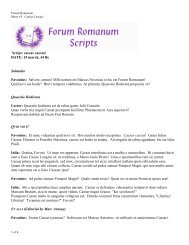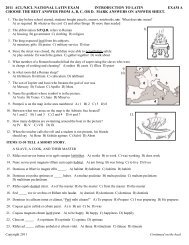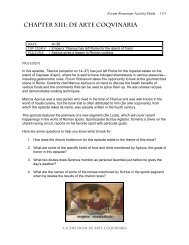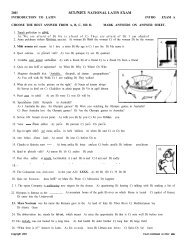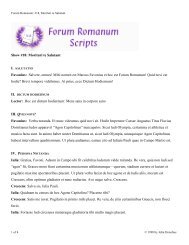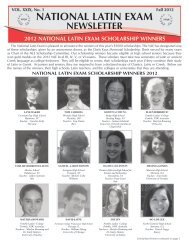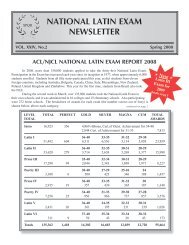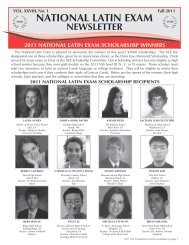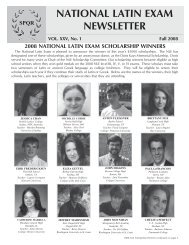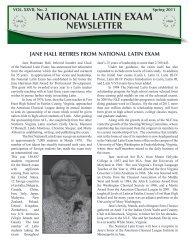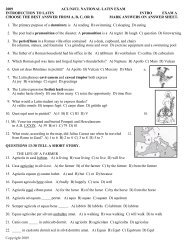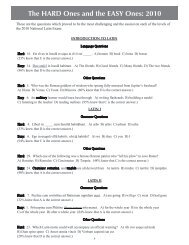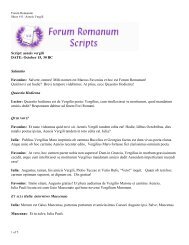You also want an ePaper? Increase the reach of your titles
YUMPU automatically turns print PDFs into web optimized ePapers that Google loves.
25. Latium, Etrūria, and Campānia were A) famous Vestal Virgins B) hills in Rome C) wives of Roman kings<br />
D) regions of Italy<br />
26. Who were the wild and capricious male mythological creatures who inhabited woods and hills? A) Furies B) Satyrs<br />
C) Fates D) Muses<br />
27. Although he was Julius Caesar’s former son-in-law, this military commander became Caesar’s opponent in Rome’s<br />
Civil War. A) Crassus B) Antony C) Pompey D) Cicero<br />
28. Optimātēs and Populārēs were A) taxes on the rich and poor B) military ranks C) offices of the Cursus Honōrum<br />
D) political factions<br />
29. Which former consul, known for his oratory, was named Pater Patriae but was later exiled? A) Cicero B) Caesar<br />
C) Brutus D) Octavian<br />
30. What rhetorical device is used in Castrōrum imperātōrem ducemque hostium in senātū vidēmus?<br />
A) transferred epithet B) litotes C) simile D) chiastic word order<br />
READ THE PASSAGE AND ANSWER THE QUESTIONS.<br />
AN OFFER HE COULD REFUSE<br />
<strong>The</strong> Samnites send a delegation to the Roman general Fabricius.<br />
Lēgātī ā Samnītibus ad C. Fābricium, imperātōrem populī Rōmānī, vēnērunt. 1<br />
Memorātīs multīs et magnīs rēbus, quae post redditam pācem Samnītibus bene 2<br />
fēcerat, obtulērunt dōnō grandem pecūniam ōrāvēruntque ut acciperet. Samnītēs 3<br />
hoc fēcērunt quod vīdērunt multa ad splendōrem eius domūs atque victūs dēfierī. 4 victūs = of his way of life; dēfierī =<br />
Fābricium esse dignum meliōribus putāvērunt. Tum Fābricius manūs ab auribus 5 were lacking<br />
ad oculōs et ad nāsum et ad ōs et ad gulam atque inde ad ventrem īmum dēdūxit 6 gulam = throat; ventrem = stomach<br />
et lēgātīs ita respondit: “Dōnec haec omnia membra quae attigī regere possum, 7 Dōnec = As long as; attigī =<br />
numquam quicquam mihi dēerit. Ergō nōn possum accipere pecūniam quae 8 I have touched<br />
nūllō modō ūsuī mihi est ab vōbīs quibus magnō ūsuī certē est. 9<br />
Adapted from Aulus Gellius, Attic Nights: Book I, XIV. 1-2<br />
31. According to lines 1-3 (Lēgātī…fēcerat), the Samnites sent envoys to Fabricius because they A) were ready to surrender<br />
B) feared that he would destroy them C) were pleased with his treatment of them D) wanted him to be their king<br />
32. How is Memorātīs multīs et magnīs rēbus (line 2) best translated? A) after the great deeds of many had been mentioned<br />
B) you mention many great deeds C) when many great deeds had been mentioned D) great deeds too many to be<br />
mentioned<br />
33. What did the Samnites offer Fabricius in line 3? A) their lasting devotion B) a great sum of money<br />
C) their military service D) a large number of slaves<br />
34. In line 3, dōnō is best translated A) as a gift B) to a gift C) of a gift D) in spite of a gift<br />
35. How should ut acciperet (line 3) be translated? A) how to accept it B) that he accept it C) however he might accept it<br />
D) as he was accepting it<br />
36. <strong>The</strong> Samnites made this offer (Samnītēs…dēfierī in lines 3-4) because they could see that Fabricius<br />
A) was a cruel commander B) was power-hungry C) did not have luxuries D) would be a just ruler<br />
37. In lines 5-6 (Tum…dēdūxit), Fabricius A) points out various parts of his body B) shows his physical strength<br />
C) displays the wounds he has received D) complains about his weaknesses<br />
38. In line 8, numquam quicquam mihi dēerit means A) I will never be away from anyone B) never will anything bother me<br />
C) he will never miss me D) never will I lack anything<br />
39. In lines 7-8 (Dōnec…dēerit), Fabricius is making a point about A) the pursuit of glory B) simplicity of needs<br />
C) control of others D) pain and suffering<br />
40. Fabricius says in lines 8-9 (Ergō…est) that he will not accept the gift because<br />
A) he thinks that the Samnites can use it more than he can B) he will not accept a gift from an enemy<br />
C) the gift was not given with sincerity D) he does not want to be indebted to anyone<br />
Copyright 2013



